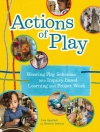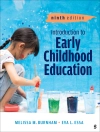Introduction to Early Childhood Education provides current and future educators with a highly readable, comprehensive overview of the field. The underlying philosophy of the book is that early childhood educators’ most important task is to provide a program that is sensitive to and supports the development of young children. Author Eva L. Essa and new co-author Melissa Burnham provide valuable insight by strategically dividing the book into six sections that answer the ‘
What,
Who,
Why,
Where, and
How’ of early childhood education. Utilizing both NAEYC (National
Introduction to Early Childhood Education provides current and future educators with a highly readable, comprehensive overview of the field. The underlying philosophy of the book is that early childhood educators’ most important task is to provide a program that is sensitive to and supports the development of young children. Author Eva L. Essa and new co-author Melissa Burnham provide valuable insight by strategically dividing the book into six sections that answer the ‘
What,
Who,
Why,
Where, and
How’ of early childhood education. Utilizing both NAEYC (National Association for the Education of Young Children) and DAP (Developmentally Appropriate Practice) standards, this supportive text provides students with the skills, theories, and best practices needed to succeed and thrive as early childhood educators.
A Complete Teaching & Learning Package
- SAGE Premium Video
Included in the interactive e Book! SAGE Premium Video tools and resources boost comprehension and bolster analysis.
- Interactive e Book
Your students save when you bundle the print version with the Interactive e Book (Bundle ISBN: 978-1-5443-6883-2), which includes access to SAGE Premium Video and other multimedia tools.
- SAGE coursepacks
SAGE coursepacks makes it easy to import our quality instructor and student resource content into your school’s learning management system (LMS). Intuitive and simple to use, SAGE coursepacks allows you to customize course content to meet your students’ needs.
- SAGE edge
This companion website offers both instructors and students a robust online environment with an impressive array of teaching and learning resources.
Mục lục
Preface
Acknowledgments
About the Authors
PART I. THE WHAT OF EARLY CHILDHOOD EDUCATION
Chapter 1. The Scope of and Need for Early Childhood Education
Developmentally Appropriate Practice and Early Childhood Standards
The Growth of Early Childhood Education
What Is Included in Early Childhood Education?
Defining Quality in Early Childhood Programs
The Future of Early Childhood Education
Summary
PART II. THE WHO OF EARLY CHILDHOOD EDUCATION
Chapter 2. The Children
Age-Related Commonalities Among Children
Factors That Influence Child Development
Children With Different Abilities
Working With Families of Young Children
Summary
Chapter 3. The Families
A Theoretical Perspective
The Changing American Family
The Needs of Families
Communicating With Families
Family Engagement
Summary
Chapter 4. The Teachers and Caregivers
The Early Childhood Teacher and Caregiver
Staffing in Early Childhood Programs
Training and Regulation in Early Childhood Education
Professionalism
Some Current Issues and Dilemmas
Family Support for the Early Childhood Profession
Summary
PART III. THE WHY OF EARLY CHILDHOOD EDUCATION
Chapter 5. Rationale Supporting Early Childhood Education
A Look Back—Children Through Time
Influential People in the History of Early Childhood Education
Influential Theorists’ Views of Child Development
Application of Theories in Early Childhood Education
Research Support for Early Childhood Education
Summary
Chapter 6. Accountability, Standards, and Assessment
Accountability: Program Standards and Assessment
Learning Standards for Young Children
Child Assessment: Informal Methods
Child Assessment: Formal Methods
Assessment Systems
Family Collaboration in Screening and Assessment
Summary
Chapter 7. Helping Children Cope With Stress
Defining Stress and Coping
Sources of Stress in Children’s Lives
Resilient Children
Techniques to Help Children Cope With Stress
Helping Families Cope With Stress
Summary
PART IV. THE WHERE OF EARLY CHILDHOOD EDUCATION
Chapter 8. The Physical Environment
Effects of the Physical Environment
Arranging the Indoor Environment
Arranging the Outdoor Environment
Adapting Environments for Different Ages and Abilities
Developmentally Appropriate Equipment
Developmentally Appropriate Materials
Technology and Interactive Media
Summary
PART V. THE HOW OF EARLY CHILDHOOD EDUCATION—CURRICULUM
Chapter 9. Scheduling and Curriculum Planning
Components of the Early Childhood Schedule
Guidelines for Program Scheduling
Types of Schedules
What Is Curriculum?
Theme-Based Curriculum
Emergent Curriculum
Family Involvement in the Curriculum
Summary
Chapter 10. Creative Development Through the Curriculum
What Is Creativity?
An Environment That Encourages Creativity
Art Theories and Philosophies
Art Activities
Music Activities
Supporting Creativity in Children of Different Ages and Abilities
Factors That Decrease Creativity
Family Values for Creativity
Summary
Chapter 11. Physical Development Through the Curriculum
A Developmental Framework for Motor Development
Components of Motor Development
Gross Motor Activities
Fine Motor Activities—Manipulatives
Caring for the Body
Supporting Physical Development in Children of Different Ages and Abilities
Family Values Related to Physical Development and Care
Summary
Chapter 12. Cognitive Development Through the Curriculum
Theoretical Foundations of Cognitive Development
Tools of the Mind
Cognitive Tasks
STEM
Supporting STEM Learning in Children of Different Ages and Abilities
Family Values for Cognitive Development
Summary
Chapter 13. Language Development Through the Curriculum
Theoretical Views of Language Development
Components of Language
English Language Learners
Language and the Early Childhood Curriculum
Supporting Language and Literacy Development in Children of Different Ages and Abilities
Family Values for Language and Literacy Development
Summary
Chapter 14. Social–Emotional Development Through the Curriculum
Theoretical Views of the Socialization Process
Emotional Intelligence
Development of Social Competence
Promoting Anti-Bias Attitudes
Activities That Promote Social Development
Supporting Social Development in Children of Different Ages and Abilities
Reflecting the Family’s Culture and Values
Summary
PART VI. THE HOW OF EARLY CHILDHOOD EDUCATION—GUIDANCE
Chapter 15. Guiding Routines and Group Activities
Guiding Routines for Individual Children
Guiding Routines for Groups of Children
Factors That Affect Group Behavior
Out-of-the-Ordinary or Unexpected Situations
Coordinating With Families About Routines
Summary
Chapter 16. Guiding Social Behaviors
What Behaviors Do Educators Expect of Young Children?
Philosophies of Guidance
Some Techniques of Guidance
What Is the Difference Between Normal and Problem Behavior?
Factors That Affect Children’s Behavior
Dealing With Specific Behavior Challenges
Working With Families to Solve Behavior Challenges
Summary
Pulling It All Together: An Early Childhood Classroom Observation
Appendix: Standards Correlation Matrix
Glossary
References
Index
Giới thiệu về tác giả
Melissa Burnham Ph.D., IMH-E®, is professor of human development and family science and early childhood education and serves as the executive coordinator of the Child and Family Research Center at the University of Nevada, Reno. Dr. Burnham obtained an endorsement in Infant Mental Health as a Research/Faculty Mentor in 2023. She obtained her Ph.D. in human development from the University of California, Davis, in 2002; her master’s degree in human development and family studies (HDFS) from the University of Nevada, Reno, in 1996; and her bachelor’s degree in HDFS from the University of Nevada, Reno, in 1994. She has been a faculty member at Nevada since the fall of 2001. Her research and areas of expertise include child development, early childhood education, and infant and early childhood mental health.












